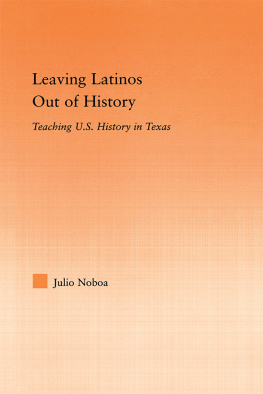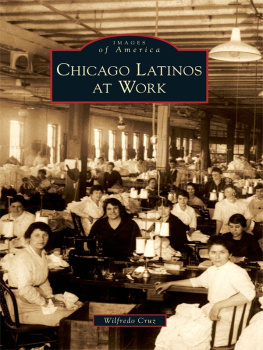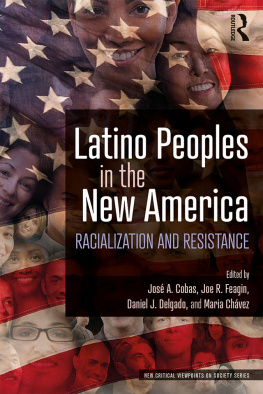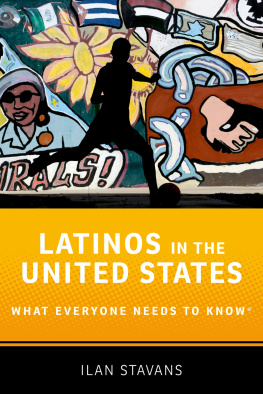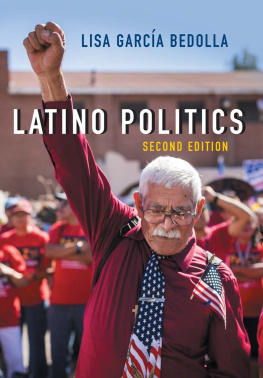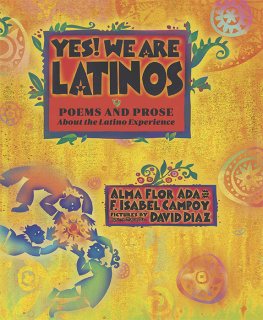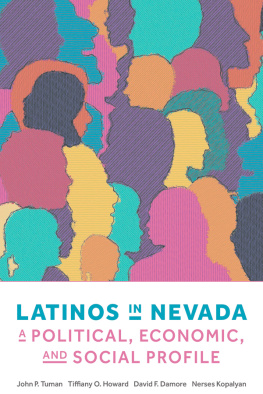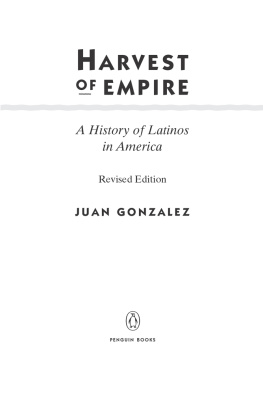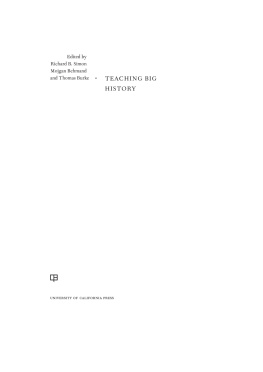LATINO COMMUNITIES
EMERGING VOICES
POLITICAL, SOCIAL, CULTURAL, AND LEGAL ISSUES
Edited by
Antoinette Sedillo Lopez
University of New Mexico
A ROUTLEDGE SERIES
Latino Communities: Emerging Voices
POLITICAL, SOCIAL., CULTURAL, AND LEGAL, ISSUES
ANTOINETTE SEDILLO LOPEZ, General Editor
SPANISH AND ACADEMIC ACHIEVEMENT AMONG MIDWEST MEXICAN YOUTH
The Myth of the Barrier
Patricia MacGregor-Mendoza
CHICANO EDUCATIONAL ACHIEVEMENT
Comparing Escuela Tlatelolco, a Chicanocentric School and a Public High School
Elena Aragn de McKissack
LATINOS AND LOCAL REPRESENTATION
Changing Realities, Emerging Theories
Florence Adams
PUERTO RICAN NEWSPAPER COVERAGE OF THE PUERTO RICAN INDEPENDENCE PARTY
A Content Analysis of Three Elections
Maria Cristina Santana
COLEGIO CESAR CHAVEZ, 1973-1983
A Chicano Struggle for Educational Self-Determination
Carlos S. Maldonado
LATINOS IN ETHNIC: ENCLAVES
Immigrant Workers and the Competition for Jobs
Stephanie Bohon
TELLING OUR STORIES
The Lives of Midwestern Latinas
Theresa Barron McKeagney
DOMINICANS IN NEW YORK CITY
Power From the Margins
Milagros Ricourt
LATINO NATIONAL POLITICAL COALITIONS
Struggles and Challenges
David Rodriguez
CREATING TROPICAL YANKEES
Social Science Textbooks and U.S. Ideological Control in Puerto Rico, 1898-1908
Jos-Manuel Navarro
BROWN EYES ON THE WEB
Unique Perspectives of an Alternative U.S. Latino Online Newspaper
Maggie Rivas-Rodriguez
PREGONES THEATRE
A Theatre for Social Change in the South Bronx
Eva C. Vsquez
THE QUEST FOR TEJANO IDENTITY IN SAN ANTONIO, TEXAS, 1913-2000
Richard A. Buitron, Jr.
CARIBBEAN SPANISH IN THE METROPOLIS
Spanish Language among Cubans, Dominicans, and Puerto Ricans in the New York City Area
Edwin M. Lamboy
SKIN COLOR AND IDENTITY FORMATION
Perceptions of Opportunity and Academic Orientation among Mexican and Puerto Rican Youth
Edward Fergus
INVITING LATINO VOTERS
Party Messages and Latino Party Identification
Stacey L. Connaughton
LEAVING LATINOS OUT OF HISTORY
Teaching U.S. History in Texas
Julio Noboa
Leaving Latinos Out of History
Teaching U.S. History in Texas
Julio Noboa
Published in 2006 by
Routledge
Taylor & Francis Group
270 Madison Avenue
New York, NY 10016
Published in Great Britain by
Routledge
Taylor & Francis Group
2 Park Square
Milton Park, Abingdon
Oxon OX14 4RN
2006 by Taylor & Francis Group, LLC
Routledge is an imprint of Taylor & Francis Group
International Standard Book Number-10: 0-415-97586-7 (Hardcover)
International Standard Book Number-13: 978-0-415-97586-5 (Hardcover)
Library of Congress Card Number 2005019512
No part of this book may be reprinted, reproduced, transmitted, or utilized in any form by any electronic, mechanical, or other means, now known or hereafter invented, including photocopying, microfilming, and recording, or in any information storage or retrieval system, without written permission from the publishers.
Trademark Notice: Product or corporate names may be trademarks or registered trademarks, and are used only for identification and explanation without intent to infringe.
Library of Congress Cataloging-in-Publication Data
Noboa, Julio.
Leaving Latinos out of history: teaching U.S. history in Texas / by Julio Noboa.
p. cm. -- (Latino communities)
Includes bibliographical references and index.
ISBN 0-415-97586-7
1. Hispanic Americans--Study and teaching--Texas. 2. Minorities--Study and teaching--Texas. 3. United States--History--Study and teaching--Texas. 4. Racism in textbooks--Texas. 5. Textbook bias--Texas. 6. Texas--Ethnic relations. 7. Texas--Race relations. I. Title. II. Series.
F395.S75N63 2005
976.4'00468--dc22 2005019512
This book is dedicated
to my parents, Julio Noboa Gonzalez,
and Simonita Polanco Noboa,
who inculcated enduring values within me.
To my wife, Elsa Duarte-Noboa,
who inspired, challenged and
encouraged me front beginning to end.
To my three children,
Julio Alejandro, Sofia Rebecca, and Cassandra Lizette,
who taught me that parents are the first teachers.
And to the children and youth of Texas
who have yet to learn
the Latino legacy of our heritage.
Contents
Chapter One Research on Latinos and Minorities in the Curriculum
Chapter Two Relevant Theory and Validity
Chapter Three TEKS Standards: Looking for Latinos
Chapter Four Textbooks: Still in the Margins
Chapter Five Teaching: Making Content Choices
Chapter Six Testimony: A Battle for the Text
Chapter Seven Summary, Interpretation, and Recommendations
- Chapter One Research on Latinos and Minorities in the Curriculum
- Chapter Two Relevant Theory and Validity
- Chapter Three TEKS Standards: Looking for Latinos
- Chapter Four Textbooks: Still in the Margins
- Chapter Five Teaching: Making Content Choices
- Chapter Six Testimony: A Battle for the Text
- Chapter Seven Summary, Interpretation, and Recommendations
- Appendix B Textbook Tables
- Appendix C Interview Questions
- Appendix D Focus Group Questions
- Appendix E Letter of Intent
- Appendix F Middle School U.S. History Checklist
- Appendix G: High School U.S. History Checklist
- Appendix H: Checklist of Critiques
Guide
This book was facilitated, guided and inspired by many teachers and mentors at every level of my formal and informal education. Several professors at the University of Texas at Austin both within and outside the Department of Curriculum and Instruction made invaluable contributions to the ultimate quality and significance of my investigation. Most of all, I am very grateful to the UTA faculty who served in my doctoral dissertation committee: Jos E. Lim, Maggie Rivas-Rodriquez, Mary Lee Webeck, and most particularly, Sherry L. Field who helped guide me through the final critical stages of this effort. Most especially, I am grateful to Mary S. Black, who provided wisdom and affirmation from the very beginning to my final completion.
Much encouragement, ideas and support were also my good fortune to receive from colleagues at the University of Northern Iowa, especially Christine Canning, with whom I had the opportunity to work closely for nearly a decade. Finally, several newer colleagues at the University of Texas at Brownsville helped with specific ideas and suggestions, including Renee Rubin, Manuel Medrano, and most specifically, Teresa Cadena, my editor, who assisted me at every level with the final development of this book.
My most heartfelt thanks to all of them, as well as to the willing participants in my investigations, the history teachers of Northside I.S.D., who generously opened up to me and freely expressed their minds on matters of profound importance to the education of coming generations.

